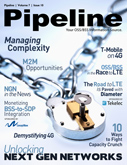|
|

Furthermore, Wireless Intelligence’s
report underscores a big part of the
LTE puzzle that remains, to date, on
the drawing board or in the lab. “We
predict that the introduction of voice
over LTE (VoLTE) by around 2012 will mark the 'tipping point' for mass-market LTE handset volume shipments, which will accelerate LTE connections
growth,” said Joss Gillet, Senior Analyst
for Wireless Intelligence, in a report
released in the last month of 2010.
Between blazing data speeds and the promise of VoLTE, LTE is certainly a
quantity that needs consideration. But what are the real concerns about the
complexity of the technology? And how can communications IT companies build the
OSS and BSS support that LTE and other next gen network technologies demand?
Knowing is Half the Battle
While I won’t suggest that LTE requires us to forget everything we know about
running a network, there are a number of complexities that should be considered.
|
|
“We predict that the introduction of VoLTE by 2012 will mark the 'tipping point' for mass-market LTE handset volume shipments…” |
|

A standard approach
for troubleshooting, alone, is still largely absent from the mix. In addition, what’s the point of building a shiny new network if you can’t
monetize it? The monetization of LTE networks can be looked at as a real
opportunity. All that data. All those potential partners. A great deal of money
to be made and a million opportunities to screw it all up with overly ambitious
rollouts that overlook the customer experience in favor of the cachet of being
first.

Which, of course, leads to the topic of CEM. These new network technologies
represent a fantastic chance to use the wealth of customer data available to
you, the provider, to maximize the positive nature of your interactions with the
customer. Will providers handle CEM in the new generation better than they did
CEM in the old? Time will tell.
|
|
|
|
|

“The major challenge I see in LTE is going to be roaming,” John Kim of Alepo
Networks told Pipeline in an interview at Mobile World Congress. “You have just
four bands on GSM, and quad-band phones used to be a big deal; there are trials
going on with 12 bands, and LTE is possible across 40 different bands. That's
definitely the biggest challenge in LTE,” (read the full interview here.)
In addition, the influx of new traffic that LTE speed facilitates requires a
redoubling of backhaul efforts. The capacity crunch that has taken root during
the period of rapid smartphone and netbook/dongle proliferation has done a great
deal to prepare carriers for this, but there is more that can be done. Is your
backhaul network prepared for LTE numbers?
Furthermore, LTE promises to introduce fixed broadband speeds into an
environment not prepared to handle the sorts of device management challenges
that fixed broadband providers have learned to deal with.
|
|

Winners?
It’s not currently clear what vendors will run away with the smart LTE money.
Bridgewater Systems closed out 2010 with a nice deal with Verizon Wireless to
provide “mobile control solutions as well as maintenance and support services
for all current and future 3G solutions,” according to the Bridgewater press
release. Meanwhile, NetCracker is being deployed in Japan to speed along the NTT
DoCoMo rollout of their solution (called Xi, for those keeping score at home),
and the contract for the Vodafone LTE rollout went to Amdocs, it was just
announced. However, as these are early days, yet, it is clear that the ultimate
victor in the quest to manage these new networks hasn’t emerged, by any stretch.
There’s a long race yet to run. And at network speeds LTE can muster, that race
promises to be a pretty exciting one.
|
|
|






